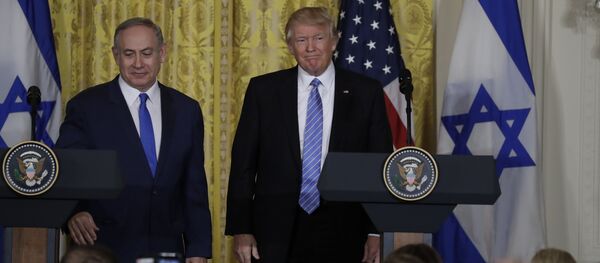US President Donald Trump is keen to broker a peace deal between the Israelis and Palestinians and the White House has been discussing the issue with the Israeli government in recent weeks.
Last month, the US President broke with decades of US policy by saying that Washington will not insist on a two-state solution to the Israeli-Palestinian conflict but wants to achieve a solution that "both parties like."
At a press conference with Israeli President Benjamin Netanyahu, Trump called on Israel to reduce its settlement-building on Palestinian land.
"I'd like to see you hold back on settlements for a little bit," he told Netanyahu.
On Saturday, Israel's Channel 2 reported the details of negotiations between the Trump administration and the Israeli government delegation in Washington on the issue.
However, a spokesperson for Israeli Prime Minister Benjamin Netanyahu said the report was "incorrect," the Jerusalem Post reported.
Dan Arbell, Senior Fellow at the Brookings Institution's Center for Middle East Policy and a 26-year veteran of the Israeli Foreign Service told Radio Sputnik that while the Trump administration is keen to broker a deal, it appears to be putting considerable pressure on Israel for concessions.
"I think that the Israeli government has been quite surprised by the fact that the Trump administration is insisting on limiting settlement activity, that Israel does not have a carte blanche to do whatever it pleases in terms of construction in the occupied West Bank," Arbell said.
The US wants an assurance that Israel will restrict settlements in order to maintain Palestinian engagement in a process that has stalled since negotiations attempted by John Kerry collapsed in 2014.
"The number one issue for them is to stop Israeli settlement activity. If the Trump administration does not work to limit Israeli settlement activity then the Palestinians would probably not come to the negotiating table."
On Thursday, the US Senate approved the appointment of David Friedman as ambassador to Israel. Friedman has attracted criticism for opposing the two-state solution and making inflammatory statements about liberal Jews.
"During his confirmation hearings he walked back some of the statements that he has made. He recommitted himself to the two-state solution and apologized for statements that he made about Jewish liberals and so on," Arbell said.
"He's a bankruptcy lawyer, he doesn't have any diplomatic experience. It'll be interesting to see how he carries out his assignments as an ambassador in Israel."
"At the end of the day, he'll probably do what the President instructs him to do and he has a very close relationship with the President so I assume that he will be on script when it comes to following the President's orders."
Arbell said that the idea of getting Sunni Arab states in the region – Egypt, Jordan, Saudi Arabia and the UAE – to support an Israeli-Palestinian peace process is a popular one in Washington and in Israel. However, the implementation of such an idea is unlikely unless Israel limits its settlement activity.
"I don't see the Gulf states or the modern Arab states at the moment coming and joining such an initiative until they get proof or an understanding that Israel is serious in its intention to limit settlement activity. If Israel will continue its settlement activity, I find it hard to see the Arab states joining any process, even if Donald Trump would be pressuring them," Arbell said.
Have you heard the news? Sign up to our Telegram channel and we'll keep you up to speed!




